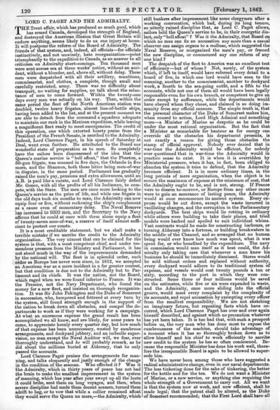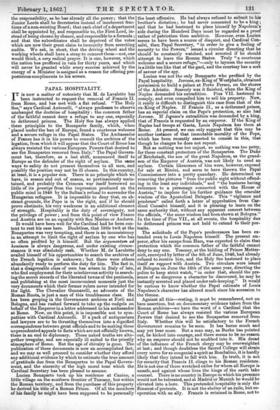LORD C. FAG-ET AND THE ADMIRALTY.
TTrent affair, which has produced so much good, which has armed Canada, developea the strength of England, and destroyed the American illusion that Great Britain will endure anything, seems likely to do us one injury at home. It will postpone the reform of the Board of Admiralty. The friends of that system, and, indeed, all officials—for officials instinctively, and not unwisely, hate reorganization—point triumphantly to the expedition to Canada, as an answer to all criticism on Admiralty short-comings. Ten thousand men were sent across sea at three weeks' notice, without an accident, without a blunder, and, above all, without delay. These men were despatched with all their artillery, munitions, commissariat, and clothes, a complete, though small and carefully restricted, army. There was no difficulty about transport, no waiting for supplies, no talk about the reluctance of men to come forward. Within the twenty-one days every man was actually on his way. Then, within the same period the fleet off the North American station was doubled, twelve heavy frigates, almost line-of-battle ships, having been added to the list, and at the present moment we are able to detach from the command a squadron adequate to maintain our rank in the Mexican expedition, while leaving a magnificent fleet ready to meet emergencies. The credit of this operation, one which extorted hearty praise from the President of the French Senate, is ascribed to the Admiralty. Indeed, Lord Clarence Paget, in his speech of Saturday at Deal, went even further. He attributed to the Board our wonderful state of preparation as to men. So completely have the sailors been dispossessed of the idea that the Queen's marine service is "hell afloat," that the Phaeton, a 50-gun frigate, was manned in five days, the Orlando in five more, and the Shannon, both these latter being men-of-war in disguise, in the same period. Parliament has gradually raised the men's pay, pensions and extra allowances, until an A.B. is paid like a curate, and Lord Clarence fairly defied Mr. Green, with all the profits of all his Indiamen, to compete, with the State. The men are once more looking to the Queen's service as the prize of life, and while one frigate in the old days took six months to man, the Admiralty can now equip four or five, without reckoning the ship's complement as a cause even of momentary delay. The Naval Reserve has increased to '3000 men, and the Secretary to the Navy affirms that he could at once with them alone equip a fleet of twenty-seven men-of-war, a reserve of itself almost sufficient to protect our coasts. It is a most creditable statement, but we shall make a terrible mistake if we ascribe the credit to the Admiralty organization. The very utmost that can be claimed for the system is that, with a most competent chief, and under tremendous pressure from the Ministry and Parliament, it has not stood much in the way of the improvements demanded by the national will. The fleet is in splendid order, such order as Europe has never seen since, in 1812, we accepted an American war as a mere incident in a far greater contest, but that condition is due not to the Admiralty but to Parliament and its chiefs. It was the nation, not the Board, which raged when we were found inferior to France. It was the Premier, not the Navy Department, who found the money for a new fleet, and insisted on thorough reorganization. It was Sir John Pakington and the Duke of Somerset in succession, who, hampered and fettered at every turn by the system, still found strength encugh in the support of the nation to break down all obstacles, and compel the departments to work as if they were working for a campaign. At what an enormous expense the grand result has been accomplished we all know, and are likely, for some years to come, to appreciate keenly every quarter day, but how much of that expense has been unnecessary, wasted by cumbrous arrangements, and dockyard jobbery, and an imbecile supervision, no man except the Naval Auditor will, we fear, ever thoroughly understand, and he will probably remark, as he did about the millions buried at Alderney, that he only passed the accounts. Lord Clarence Paget praises the arrangements for manning, and talks eloquently and justly enough of the change in the condition of the seaman. Who effected it ? Was it the Admiralty, which in thirty years of peace has not had the brain to make the smallest improvement in the system of manning, which has year after year swept up all the louts it could bribe, sent them on long voyages, and then, when severe discipline had made them decent seamen, turned them adrift to beg, or to vow that while a collier remained afloat they would serve the Queen no more,—the Admiralty, which still hankers after impressment like some clergymen after a working convocation, which had, during its long tenure, so utterly ruined discipline that, as Lord C. Paget allows, sailors held the Queen's service to be in their energetic dialect, only "hell afloat" ? Was it the Admiralty, that Board on which no man can fix an accusation any more than a casual observer can assign organs to a mollusc, which suggested the Naval Reserve, or reorganized the men's pay, or framed the new discipline, or commenced any one reform of any one kind ?
The despatch of the fleet to America was an excellent test of efficiency—but of whose ? Not, surely, of the system which, if left to itself, would have referred every detail to a board of five, in which one lord would have seen to the manning, another to the commissariat, another to dockyard work, a fourth to the sea-going outfit, and a fifth to the accounts, while not one of them all would have been legally responsible even for his own branch, or competent to give an order except by sufferance, while the departments would have obeyed whom they chose, and claimed in so doing immunity from any official censure. The simple truth is, that the personal character of the Duke of Somerset makes him, when roused to action, Lord High Admiral and something more—a Minister of Marine as despotic as he could be under the most rational organization. But the fact that a Minister as remarkable for hauteur as for energy can override all the obstacles his department presents, is not exactly a reason for giving those obstacles the stamp of official approval. Nobody ever denied that in war-time the Admiralty would be efficient, for nobody ever questioned that in war-time the Admiralty would in practice cease to exist. It is when it is overridden by Ministerial pressure, when it has, in fact, been obliged to abandon the system it tries to defend, that the Admiralty becomes efficient. It is in more ordinary times, in the long periods of mere organization, when the object is to secure the maximum of expense at the minimum of cost, that the Admiralty ought to be, and is not, strong. If France were to disarm to-morrow, or Europe from any other cause were to gain an assurance of lasting peace, the Admiralty would at once recommence its ancient system. Every expense would be cut down, except the waste incurred in vacillating changes, and the corruption in the Parliamentary dockyards. The best ships would lie rotting in ordinary while others were building to take their places, and tried models were hacked and spoiled to suit individual whims. Vast contracts would be made for constructing harbours, or turning Alderney into a fortress, or building breakwaters in the middle of the Channel, and so arranged that no human being would ever know how much was spent, what it was spent for, or who benefited by the expenditure. The navy in commission would man itself as it best could, the Admiralty only taking care that whenever a man knew his business he should be immediately dismissed. Stores would be sold without orders and replaced without authority, every dockyard would adhere to its traditional system of expense, and vessels would cost twenty pounds a ton or sixty, according to the port in which they were constructed. Some three or four millions would be saved on the estimates, while five or six were expended in waste, and the Admiralty, once more sliding into the official groove, would meet every complaint by the complexity of its accounts, and repel accusation by exempting every officer from the smallest responsibility. We are not sketching an imaginary future, but repeating facts which have occurred, which Lord Clarence Paget has over and over again himself described, and against which no precaution whatever has yet been taken. It is too bad that, with such a prospect before us, the very man who has done most to expose the cumbrousness of the machine, should take advantage of a moment when it has so thoroughly broken down as to allow himself and his chief to work efficiently to ascribe new credit to the system he has so often condemned. Because the responsible Minister has done his work well, therefore the irresponsible Board is again to be allowed to supersede him.
We have never been among those who have suggested a radical administrative change, even in our naval departments. The less tinkering done for the sake of tinkering, the better for the kettle and for the tea. We do not want a Minister of Marine, or a new service, or anything else requiring the whole strength of a Government to carry out. All we want is that the system now at work, and now efficient, shall be made legal; that the patent shall be altered, as the Duke of Somerset recommended; that the First Lord shall have all the responsibility, as he has already all the power; that the Junior Lords shall be Secretaries instead of incoherent fractions of a non-existing Board; that each chief of a department shall be appointed by, and responsible to, the First Lord, instead of being chosen by chance, and responsible to a formula ; and that the subordinates shall be deprived of the votes which are now their great claim to immunity from searching audits. We ask, in short, that the driving wheel and the working wheels shall have a strap to connect them—not, one would think, a very radical prayer. It is one, however, which the nation has proffered in vain for thirty years, and which will never be granted while every success achieved by the energy of a Minister is assigned as a reason for offering preposterous compliments to his screen.































 Previous page
Previous page